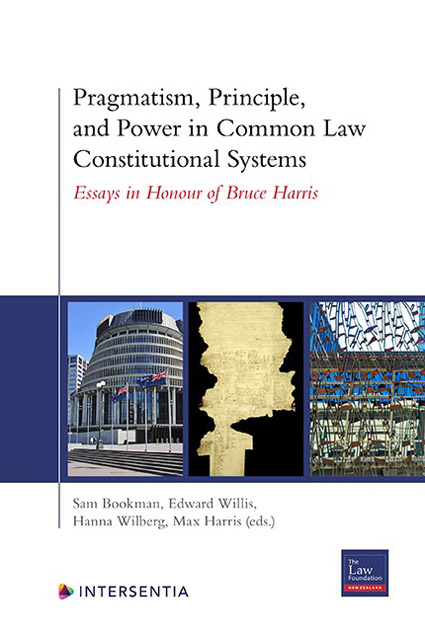 Pragmatism, Principle, and Power in Common Law Constitutional Systems
Pragmatism, Principle, and Power in Common Law Constitutional Systems Book contents
- Frontmatter
- Foreword
- Preface
- Contents
- The Writings of Professor Bruce Harris
- List of Cases
- List of Contributors
- Introduction
- Part I The Nature of Executive Power
- Part II Issues Concerning The Judiciary: The Nature of Judicial (and Executive) Power
- Part III Issues Concerning The Judiciary: Creativity and Pragmatism in Judicial Method
- Part IV Issues Concerning The Judiciary: Judicial Appointment and Accountability
- Part III The Nature of Unwritten Constitutions and Their Future
- Index
A Māori Perspective on Constitutional Issues, Especially Executive Power
Published online by Cambridge University Press: 19 November 2022
- Frontmatter
- Foreword
- Preface
- Contents
- The Writings of Professor Bruce Harris
- List of Cases
- List of Contributors
- Introduction
- Part I The Nature of Executive Power
- Part II Issues Concerning The Judiciary: The Nature of Judicial (and Executive) Power
- Part III Issues Concerning The Judiciary: Creativity and Pragmatism in Judicial Method
- Part IV Issues Concerning The Judiciary: Judicial Appointment and Accountability
- Part III The Nature of Unwritten Constitutions and Their Future
- Index
Summary
INTRODUCTION
In his book New Zealand Constitution: An Analysis in Terms of Principles, in the chapter on te Tiriti o Waitangi, Harris concludes that ‘the perspective of each of the three branches of government in determining what is law and what is not does, however, remain that of the Anglo-New Zealand lawyer rather than that of the Māori-New Zealand lawyer’. Here, I attempt to bring a Māori perspective to New Zealand constitutional law and Harris‘s specific contribution to scholarship on constitutional legal issues here and elsewhere.
Harris 's recognition of, and explicit drawing attention to, M ā ori lawyer perspectives on New Zealand law is remarkable. It epitomises Harris's support for the long-time claim by Māori that orthodox accounts of law ignore Māori views on New Zealand's constitution and the ways in which it – illegitimately – continues to subject us to law that is not our own. He clearly sees the structural racism. It also reflects that Harris, and arguably mainstream scholarship more widely, now sees and encourages spaces for Māori perspectives to contribute to orthodox understandings of New Zealand public law. This is significant. Shifting of orthodox constitutional law contributes to positive incremental change of New Zealand's constitution to better realise Māori legitimate claims and rights. This is particularly important in a context where incrementalism is the primary modus operandi for changing New Zealand's constitution.
However, as I will reflect on later in this contribution, Harris remains somewhat conservative in his assessment of Māori claims for constitutional transformation. He appears to be sitting inside the Western-constitutional box presenting only options from the Anglo-constitutional tradition as credible and/or realistic. Here, I hope, Harris is out of step with developing political and social context and law, and there is more scope for creativity, and justice, than he might suggest.
Harris is a pre-eminent public law scholar here and internationally. This is especially evident in his work on what he terms the third source of executive power. Bringing my Māori lawyer's lens to this issue, I wonder whether the more pressing question for New Zealand constitutional lawyers in this space might be a different one, namely how to ensure the executive is held to account to the honour of the Crown with respect to Māori.
Information
- Type
- Chapter
- Information
- Pragmatism, Principle, and Power in Common Law Constitutional SystemsEssays in Honour of Bruce Harris, pp. 13 - 28Publisher: IntersentiaPrint publication year: 2022